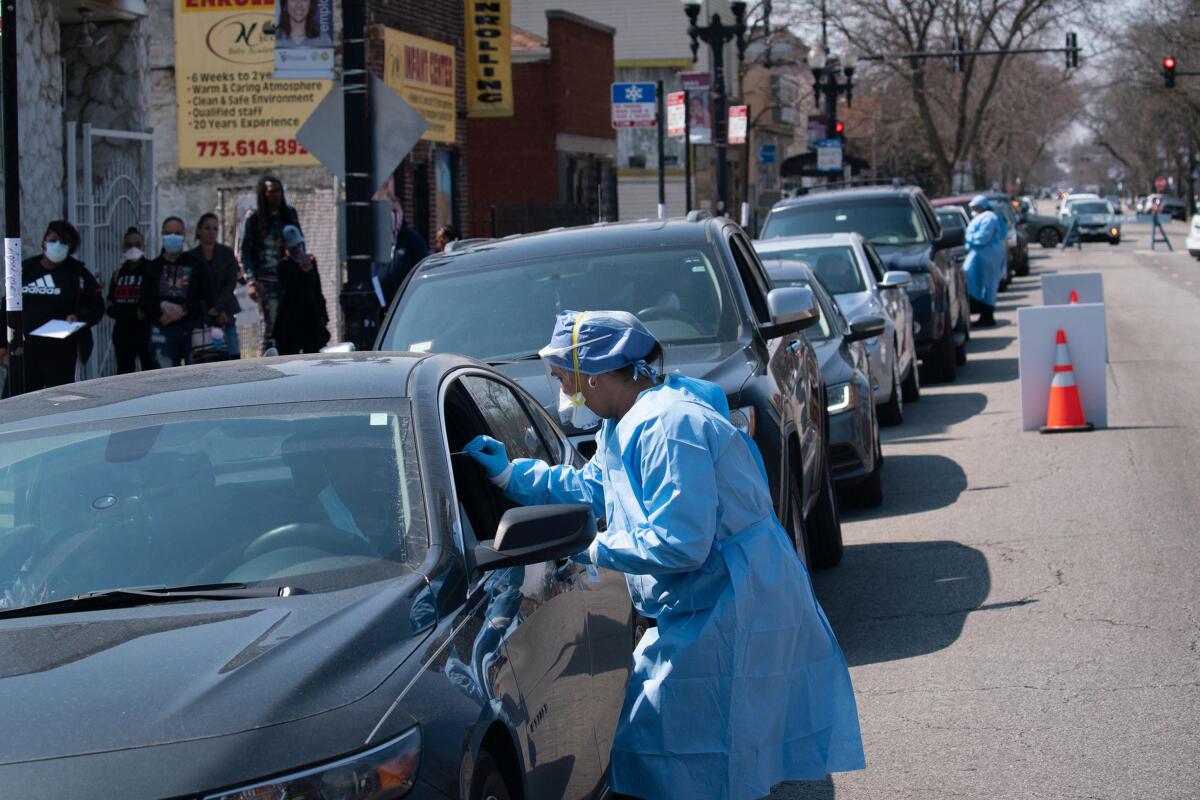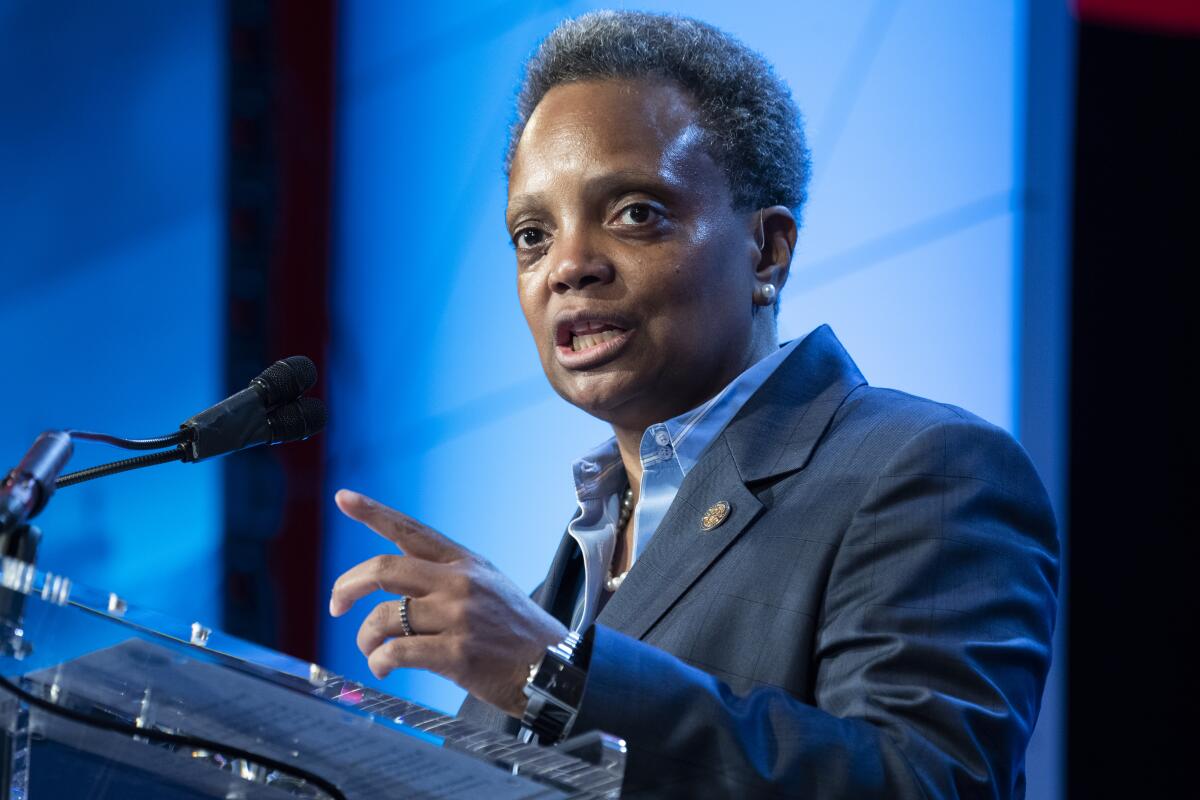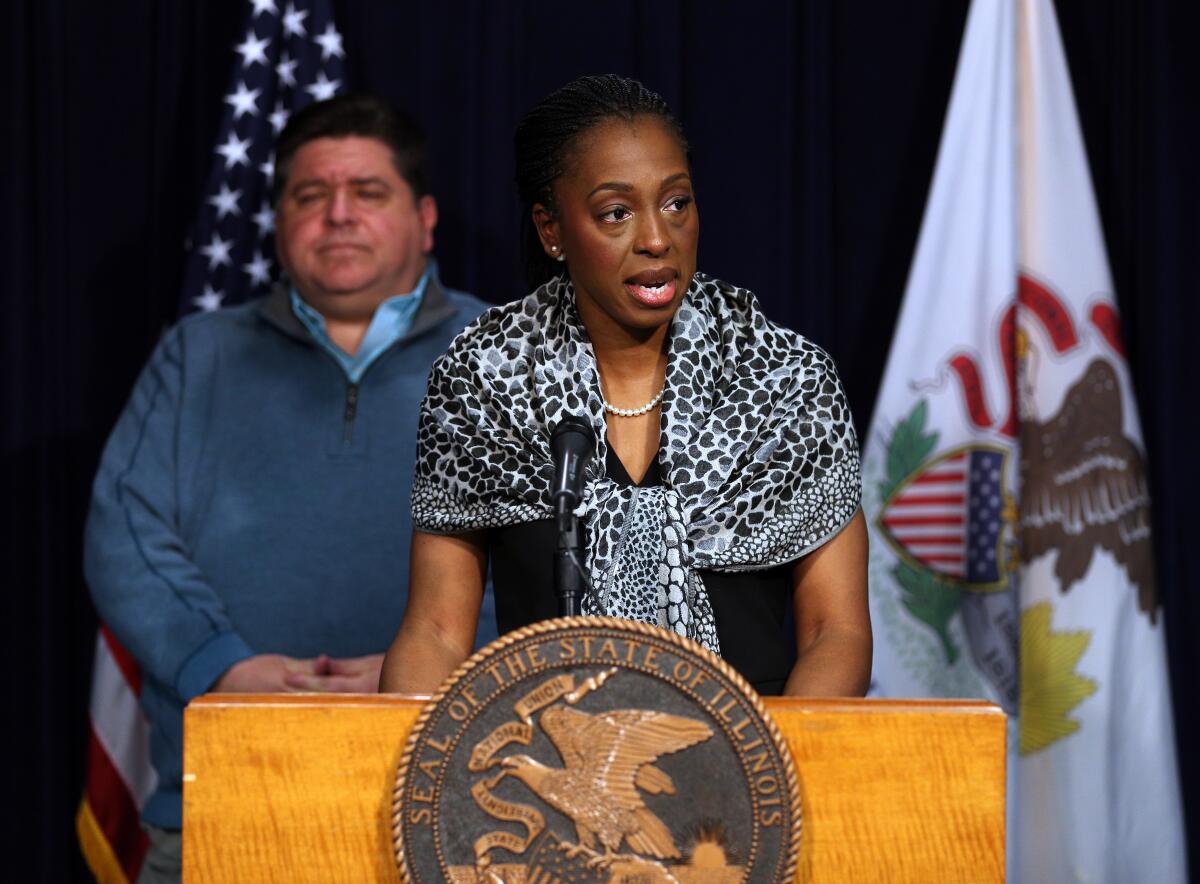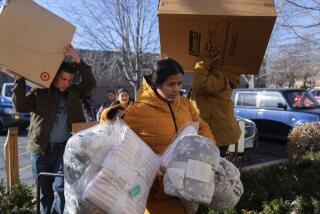In Chicago, black residents make up more than half of coronavirus cases

- Share via
CHICAGO — Chicago Public Health Commissioner Dr. Allison Arwady outlined the city’s grim coronavirus statistics along racial lines.
Although only 30% of the city is black, more than half of Chicago’s COVID-19 cases have hit African Americans, and 72% of the dead were black, Arwady said.
That’s driven in part by already-existing inequities, Arwady said. In Chicago, there’s an 8.8-year gap in life expectancy between white and black residents, largely driven by chronic disease, she said.
But it’s also driven by economic disinvestment and other issues on the city’s South and West sides, Arwady said.
“Even if we had a perfect healthcare system in which anyone could access a doctor,” Arwady said, “we would still see significant health disparities because of food deserts and lack of walkable streets.
“By and large, this is not, I’m sorry to say, a surprising story. It is one that demands action in a short-term way and in the way we will be working for decades to come,” Arwady said.
Taking the podium, Mayor Lori Lightfoot said, “Those numbers take your breath away.”
“This is a call-to-action moment for all of us. When we talk about equity and inclusion, they’re not just nice notions,” Lightfoot said. “They’re an imperative we must embrace as a city.”
To address the issue, the city is ordering healthcare providers to collect total demographic information from patients, Lightfoot said. Some haven’t been collecting and sharing that information.
“This is not negotiable,” she said.
Lightfoot also announced a task force comprising activists and community groups, including West Side United. They’ll be doing outreach, among other tasks, Lightfoot said.

The city will also start using bigger buses to promote social distancing and send inspectors into grocery stores and corner stores to ensure that they’re enforcing social distancing.
“If you do not, we will shut you down,” Lightfoot said.
Calling the situation a “public-health red alarm,” Lightfoot earlier on Monday pledged that her administration will address the coronavirus’ toll on black and brown Chicagoans after data showed they were being hit especially hard by the disease.
“It’s devastating to see those numbers and knowing that they’re not just numbers, they’re lives. There’s families and communities that have been shattered,” Lightfoot said. “That’s why we will be announcing a very robust and immediate comprehensive plan to address this.”
Speaking in front of a soccer goal inside an empty Soldier Field as part of a broader “stay home, save lives” public awareness campaign, Lightfoot said she would be unveiling a plan later in the day.
“This is something that is a public-health red alarm that we have to make sure that we are stepping up as a community to address it, and we are going to be activating every part of the black and brown communities, [from] the faith community to elected officials to neighborhood organizations and of course the network of health providers, not just the hospitals but also the doctors, the insurance companies,” Lightfoot said. “This is something we have to tackle as a community.”
She added: “Now, we’re not going to be able to erase decades of health disparities in a few days or a week, but we have to impress upon people in these communities that there are things they can do, there are tools at their disposal that they can use to help themselves, but we have to call this out as it is and make sure we’ve got a very robust multitiered response now and going forward, and we will.”
Lightfoot also said the numbers reflect a broader trend. “We have equity and health-access disparities all across our city, and particularly in black and brown neighborhoods,” Lightfoot said. “We know that problems of diabetes, of heart disease, of respiratory illness, are really prevalent in communities of black and brown folks. We know that access to healthcare is a similar challenge in a lot of those communities.”
West Side Ald. Jason Ervin, who chairs the City Council Black Caucus, said an “all-hands-on-deck approach” is needed to address the high rates of infection in the African American community. But he said it will be tough to cope with all the issues at play.
“There are myriad factors that go into this. Poverty is one, and people with underlying issues who don’t have ready access to appropriate health care,” Ervin said.
“You’ve got high rates of asthma and other respiratory problems in the African American community, and then you have high rates of non-compliance in some parts of the city with the stay-at-home orders,” he said.
Ervin also pointed to a recent Illinois State Police order ending the lab testing of narcotics and cannabis, which caused Cook County State’s Attorney Kim Foxx to announce she would stop prosecuting such cases for lack of evidence. That has emboldened drug dealers, whose outdoor sales in West Side and South Side neighborhoods with big black populations continue to bring lots of people into contact with each other in an unsafe way, Ervin said.
“Another part of the problem is drug sales continue in parts of my ward, and with this state police directive, people know they aren’t going to get prosecuted unless they get caught with two or three kilos of heroin,” Ervin said. “These drug dealers know they can do what they want right now, and it’s another complicating factor in the transmission of the virus.”

On Saturday, Dr. Ngozi Ezike, the state’s public health director, said officials were looking at the issue.
“As we put on our health-equity lens, we already know, before COVID was ever established, that the health outcomes for various communities are already different. And those were already things the Illinois Department of Health and all local health departments have been very keyed in on how to narrow those disparities,” Ezike said. “So if you know those disparities exist in terms of health outcomes, you can imagine that overlaying a new disease is only going to exacerbate whatever inequities already exist. So the Department of Health at the local, state level will continue to try to address these disparities. But as I’m saying, it’s early; we’re still looking at our data. But if that were to bear out, we would not be entirely surprised, because we know what the existing baseline is.”
Pratt and Byrne write for the Chicago Tribune.
More to Read
Sign up for Essential California
The most important California stories and recommendations in your inbox every morning.
You may occasionally receive promotional content from the Los Angeles Times.













